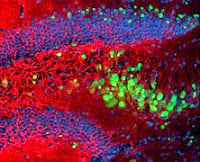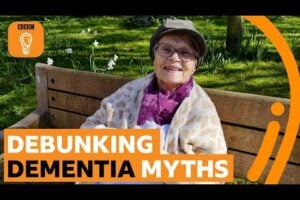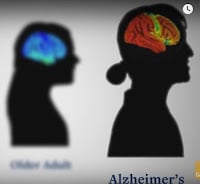Abnormal build-up of beta-amyloid and tau proteins are considered the primary indicators of Alzheimer’s disease in the brain. Yet many people, like the ladies in the “Nun Study”, seem to have “resilient cognition”, and do quite well despite the fact that their brains are filled with these destructive proteins.
Researchers have been scratching their heads about this anomaly for years. TDP-43 may finally hold the answer.
Overview from CBS (Article Appears Below This Video)
Abnormal build-up of beta-amyloid and tau proteins are considered the primary indicators of Alzheimer’s disease in the brain. Yet many people, like the ladies in the “Nun Study”, seem to have “resilient cognition”, and do quite well despite the fact that their brains are filled with these destructive proteins.
Researchers have been scratching their heads about this anomaly for years. TDP-43 may finally hold the answer.
Overview from CBS (Article Appears Below This Video)
3 Partners Behind Alzheimer’s?
Amyloid “plaques” and tau “tangles” form and increase for years in the brains of people with the disease, usually well before symptoms such as memory loss become apparent.
Little is known about the role in memory loss and dementia of another protein, TAR DNA binding protein of 43kDa (TDP-43). TDP-43 is seen in ALS and frontotemporal dementia.
Keith Josephs, M.D. of the Mayo Clinic and colleagues conducted a study to determine whether TDP-43 has an effect, independent of amyloid and tau, on the course and symptoms of Alzheimer’s. The results were reported at the Alzheimer’s Association International Conference.
The researchers conducted post-mortem examinations on the brains of 342 people who were determined to have Alzheimer’s disease based on the extent of tau tangles in the cortex. The subjects’ brains were screened for the presence, amount, and distribution of TDP-43, and these findings were correlated with the results of tests of memory and cognition taken when the subjects were alive. The researchers also used MRI to assess atrophy in several brain regions.
In-Depth Video
After controlling for other factors including age at death, amyloid deposition, genetic risk for Alzheimer’s, and vascular disease, the scientists concluded that the 195 study subjects with TDP-43 were 10 times more likely to have been cognitively impaired at death than subjects without TDP-43. They found that the “third protein” had strong correlations with cognition, memory loss, and shrinkage of the hippocampus, an area of the brain that is important to memory and is especially damaged in Alzheimer’s.
The scientists speculate that absence of TDP-43 may help explain why some people have plaques and tangles in their brain, but do not experience dementia.
“These findings show that TDP-43 amplifies memory loss and hippocampal atrophy in Alzheimer’s disease, and also appears to overpower what has been termed ‘resilient cognition’ in Alzheimer’s, where subjects remain cognitively normal in spite of high levels of Alzheimer’s brain changes,” said Josephs. “This suggests that TDP-43 is a key player in the Alzheimer’s neurodegenerative process, and should be considered a potential therapeutic target for treatment of the disease.”
REFERENCES:
Staging TDP-43 Pathology in Alzheimer’s Disease.
Acta Neuropathol. 127(3):441-50. doi: 10.1007/s00401-013-1211-9. Epub 2013 Nov 16.
TDP-43 is a key player in the clinical features associated with Alzheimer’s disease, Acta Neuropathol. Volume 127, Issue 6, pp 811-824
MORE INFORMATION:
About AAIC
The Alzheimer’s Association International Conference (AAIC) is the world’s largest gathering of leading researchers from around the world focused on Alzheimer’s and other dementias. As a part of the Alzheimer’s Association’s research program, AAIC serves as a catalyst for generating new knowledge about dementia and fostering a vital, collegial research community. Scientists leading the advancement of research gather to report and discuss the most current data on the cause, diagnosis, treatment and prevention of Alzheimer’s disease and related disorders.
About the Alzheimer’s Association
The Alzheimer’s Association is the world’s leading voluntary health organization in Alzheimer care, support and research.











